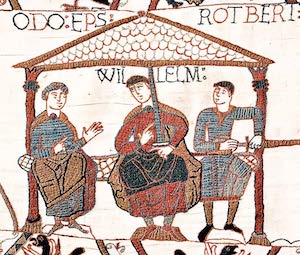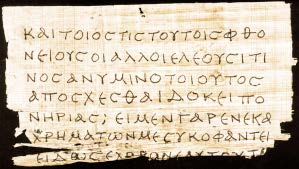
Buy the Grammar by Terry Howard

Grantville, 1636
"Noble's Book Barn." Adelbert turned to his wife, Anna Margaret Herman. "What a strange name. Do they mean to suggest that a noble has so many books he needs a barn to hold them? Or that he is actually engaged in the vulgar process of selling them, like some common fishwife hawking cockles and mussels through the streets in a push cart? Or do they mean to suggest that they are only prepared to sell their books to nobles?"
Anna Margaret chuckled at her husband's witticism. "This is Grantville, dear. They don't believe in nobility. That is why the king is greeted as Captain-General when he comes here. You know this. We have been told about it repeatedly."
"They could mean they have a barn full of books suitable to sell to nobles?"
"Or," she replied, "that the books are only fit to be kept in a barn?"
"Or is the shop owned by someone with the odd name of Noble? I'd say Noble was an Englishman but here in Grantville, if they are up-timers, then it means nothing. Recall the way that West Virginian bragged about their melting pot. To think he went on to brag about being a—" Adelbert's voice shifted to mimic his source. "—'pure-bred American mongrel' is incredible. And he freely—even proudly—claimed to have the blood of ignorant heathen savages running in his veins, diluting his civilized Christian ancestry."
"Or," his wife replied, squeezing his arm, "the name of the book store is more of the up-time marketing we were told about. The name has definitely caught your eye and attention. And if it means anything at all, it probably means that the books are like the art. If you are not truly noble, you will not be able to afford to buy them."
"Let's see what they have to offer, shall we?"
The first thing he noticed when they came through the door of the small shop was a display announcing, "Speak Amideutsch like a native." The second thing he noticed was that his wife was indeed correct. Only someone who did not ask what the price was would be comfortable buying the books. They had seen books for sale in the park at half the price the shop was asking and they were selling poorly even at that price. They had bought so many that they sent the servant back to their lodging to unload them. If the footman didn't catch up with them, it might be the end of what they bought for the day. Or they would have to keep a list and send someone to pick up for them.
There was a slight dictionary and a thicker grammar. The same introduction appeared in each book in Latin and in Amideutsch explaining the new language.
The author, Jacqueline Pascal, wrote:
It is said that in 1066 when a Norman French man-at-arms tried to make a date with an Anglo-Saxon bar maid, the resulting bastard was English. Centuries later, when this mature English bastard met the Ladies of the Germanies, in trying to communicate they created—or are even now creating—a new language that is being called Amideutsch. And while the West Virginians are being generous about accepting German vocabulary, they are standing their ground when it comes to accepting German grammar.
In a book by one Bill Bryson on the history of the English language entitled "Mother Tongue," he talks about the creation of the English language out of Norman French and Anglo-Saxon German with a vast horde of other sources. My favorite sentence out of his work goes something like, "Cases are gone for good, and it's good that they're gone." German cases in Amideutsch are dead or are quickly dying, in the face of the up-timer American's disdain and disregard. It is my clear intent to help them into an early and permanent grave, while giving the minimally necessary consistent and logical structure to the language that is destined to replace Latin as the universal language of scholarship and trade, if for no other reason than the vast library in English that Grantville has presented as a gift to the world. For if you can read Amideutsch, then you can read West Virginia's up-time English. Just as both vocabularies survived out of the French and the Anglo-Saxon tongues in England, the greater part of both vocabularies are likely to survive in Amideutsch, especially since so many of the old Germanic roots are still there in up-time English and especially since it is the English grammar, or more precisely when it comes to cases, the lack thereof, that looks to be surviving.
This is not surprising. It happened as long ago as Alexander the Great. He conquered the known world and imposed Greek on the empire as a common language. But the conquered peoples of the empire had their revenge. They looked at the complicated, beautiful, noble, grammar of classical Greek and laughed at its pretensions of grandeur. Knowing that, the lowest common denominator for a language—if it is to be of use—is that it must be understandable and then reproducible, they—to use a good Amideutsch phrase taken from English—dumbed it down. They simplified it, modified it, corrupted it, added vocabulary while ignoring complicated grammar, and claimed it as their own.
One of the things I learned while preparing this book is that Koine Greek is not unique to the Bible, as scholars have long thought and taught. It is not Holy Ghost Greek as so many generations of students have been misinformed. There are tons of scrap paper in garbage dumps under the sands of Egypt where Holy Koine Greek is used for contracts, ordinary letters, and shopping lists. They're just sitting there, waiting to be dug up and shared with the world. Classical Greek is much more formal and complicated and if you are going to read it, having Koine Greek is not going to let you do it any better than knowing up-time English is going to let you read Shakespeare or Chaucer.
 What happened when Alexander's Greek met the world and William the Conqueror's French met the Anglo-Saxons is happening again as Hillbilly pathos encounters proper elegant German. German, high and low, strives to stave off the advances of the Hillbilly man-at-arms. Even as I write this in the year of the Lord 1636, this book acknowledges the trend, applauds the trend and fully endorses it.
What happened when Alexander's Greek met the world and William the Conqueror's French met the Anglo-Saxons is happening again as Hillbilly pathos encounters proper elegant German. German, high and low, strives to stave off the advances of the Hillbilly man-at-arms. Even as I write this in the year of the Lord 1636, this book acknowledges the trend, applauds the trend and fully endorses it.
Adelbert looked up from the introduction to ask the sales clerk, "Am I to understand that the scholar who assembled this is female?"
"Female, French, and eleven," the clerk, Jacob Straley, replied.
"Eleven what?"
"Eleven years old."
Adelbert laughed, snapping the book closed and putting it back without looking past the introduction. "And her father wasted his money on having his little girl's hobby printed? You actually expect people to buy this?"
The clerk looked at him slyly, with half-hidden condescension. "I've got twelve signed copies tucked away as presents for my grandchildren who will sell these first edition copies of the first book on the topic by the mother of Amideutsch someday for enough to set themselves up in business."
Adelbert looked at the young man who had proudly been shaving for two years and had surely cut himself both times, "And just how many grandchildren do you and your wife have?"
"She hasn't married me yet. So it will be twenty years before I have grandchildren and another twenty before they are ready to go into business. But when they are, the money will be waiting."
The young man sounded absolutely sincere.
"You are surely joking?"
"Nope. That little girl is the foremost translator in Grantville." This was an overstatement, but not by much. "She collects languages like other kids collect butterflies and butterflies have a special meaning in the new language of Grantville." The boy tapped the pile of dictionaries. "There is no one in town who can speak more languages than she can."
Adelbert sternly demanded, "Surely you exaggerate?"
Jacob firmly shook his head. "Nope. The girl is a genius. You should have been here when the high school produced the Amideutsch play she wrote. Someone kept score. She got ten percent more laughs from the German jokes than she did from the English ones."
"Well, of course," Adelbert countered. "She's not English."
"She's not German either. She's French. But there were at least twice as many German speakers in the audience as there were English speakers. And the funniest thing in the play was the Polish gentleman who spoke neither German nor English at all well." The boy laughed at the memory. "You wouldn't believe the things she had the man saying without his realizing it.
"We've got a printing of the play. But you'll need the dictionary and the grammar to understand it."
Adelbert's face clearly said "no way." So Jacob added, "The transcripts of TV shows and movies are selling well. They're in English of course. Star Trek and Star Wars are selling best. The expanded German translations with explanations are selling better."
"What have you printed in the way of serious works?"
"Nothing. We are not printers. We are just booksellers. By standing arrangements, we have copies of anything that has been printed in the way of a book in Grantville ever, or in Magdeburg since they started printing again after the sack, or in Jena since about the same time. If any printer has copies for sale, so do we." The lad did not add that they had copies after the printer sold out because almost everyone knew that no one had higher prices than Noble's Book Barn.
The lad didn't mention the sizeable markup one would pay for the convenience of one-stop shopping as he pointed out first a section of used, mostly paper-bound books. "We have the largest selection of up-time books for sale in one place anywhere in Grantville." Then he pointed to a section of shelves with mostly hardcover books behind a counter on which pairs of white gloves were waiting. "And we have the finest selection of quality up-time books for sale in Grantville." Then with a sweeping gesture he indicated the rest of the shop. "And we have copies of any book in print, whether it is a reproduction or translation of an up-timer work, or a printing of a down-time work, or—" He tapped the stack of grammars in front of him. "—we have the second greatest pride of Grantville. We have new works of scholarship. We've got Getting Acquainted with Grantville Laws, Customs, Society, and the Working World by Sarah Cochran Reardon in fourteen different languages. They're mostly translated by Jacqueline Pascal. So even if they're the most affordable items in the store—" He tapped the stack of dictionaries. "—you're not interested because the author and the translator are both girls."
He continued his sales spiel. "We have complete sets of all of the encyclopedias that have been printed here and now. We even have copies of books out of Reverend Green's private library that no one is going to buy because no one can read them. But they have been printed in Grantville, so we have copies for sale. And we did sell one of them, once."
"What kind of book do you have that no one is ever going to buy?"
 "Well, someone bought a complete concordance of the Greek New and Old Testament. We have a basic Greek and a grammar and a lexicon, all in up-time English, so if you wish to learn up-time English, you can then use it to learn Greek. If you want to learn Greek, why learn English first? And we have the Dead Sea Scrolls in mostly Hebrew, but it's a Hebrew so old that even the Jews have trouble reading it. None of them sell. But they were printed here in town and we have copies if you wish to buy them."
"Well, someone bought a complete concordance of the Greek New and Old Testament. We have a basic Greek and a grammar and a lexicon, all in up-time English, so if you wish to learn up-time English, you can then use it to learn Greek. If you want to learn Greek, why learn English first? And we have the Dead Sea Scrolls in mostly Hebrew, but it's a Hebrew so old that even the Jews have trouble reading it. None of them sell. But they were printed here in town and we have copies if you wish to buy them."
"What is a concordance?"
"Every place a word is used in the bible is indexed. So if you know a word in a verse you can find the verse."
"What?"
"Let me show you." The clerk grabbed an oversized volume off the shelf. "This is a Strong's Concordance of the English Authorized Version. Take a word like rest—" That being where the volume fell open. "—here it lists every place by book chapter and verse where the word is used."
"Do you have that in German?"
"No. But Jacqueline is working on it." This was true, but he didn't mention that she was working on it along with a number of other contributors, it being ultimately under Doctor Albert Green's direction.
"That is too bad. I could use such a book in German."
Adelbert glanced at his wife who was thumbing through the selection of up-time printed romance novels priced to be sold more as curios than as books. "My wife and I want to take something home with us to display, which says we were in Grantville, and that would have been a good choice."
"Leave me an address," Jacob smiled ingratiatingly. "When the book comes out, I'll drop you a line."
"You'll what?"
"Drop you a line. It means send you a letter." Cocking his head, he continued, "But then, if you had a dictionary which includes common Amideutsch phrases, you could look it up. If you want a souvenir of Grantville that will go up in value and be a prized possession by your family for generations to come, then you want the book you just put back on the pile."
Adelbert looked dubious but the clerk stood firm. Adelbert picked up the dictionary. "That is rather thin for an entire language."
"True. She will have to compile a thicker dictionary as the vocabulary grows and changes. But the grammar is the important part of the duet and while the dictionary will change to match the language, the language will change to match the grammar, because the way she has it laid out just makes too much sense."
"You seem very sure of something which has yet to happen."
"Read the grammar and if you do not agree with me that she knows what she is talking about, I'll bend the rules and buy it back from you used at the full price as long as it's not written in or abused."
"Herr Nobles won't mind?"
"The owner? No, my mother won't mind."
"Her name is Nobles?"
"No, that was the name of her favorite bookstore up-time. She thought the name might bring her luck.
"If you want something to take home and don't want the Amideutsch duet, then we have the current edition of the dictionary of newly invented Latin technical words, if that might interest you more. But you are missing a sure thing if you don't take Jacqueline's books home. And the printer is working on a revised second addition of the Latin Technical Dictionary. Jacqueline is a contributing editor to both the current and the new Latin dictionary, by the way."
"Who is this paragon of languages?"
"She is the sister of Blaise Pascal, the great French mathematician, physicist, inventor, writer and Christian philosopher."
"Never heard of him."
Jacob snickered. "Well, you'll have to wait until he grows up and gets around to writing them or read the copies we brought back with us from the twentieth century. Thirty years from now, he once would have said, 'Apart from Jesus Christ, we do not know what is our life, nor our death, nor God.'
"I know someone who once quoted that line to the boy, and Blaise said, 'That is very profound. Who wrote it?' The person said, 'for a dollar I'll introduce you and you can spend as much time with him as you wish.' Well, Blaise forked over the dollar—"
"Forked over?" Adelbert interrupted.
Jacob handed him a dictionary and said, "Look it up," and then continued. "When my acquaintance had the dollar in hand, he said, 'Blaise Pascal, meet Blaise Pascal.' Then Blaise said, 'Shit. How am I supposed to live up to all of that?' "
"Well, that is who her brother is. But who is she?"
"I told you, she is Grantville's greatest translator. When her next Amideutsch play comes out next week she will be crowned Grantville's favorite playwright. For now that's Shakespeare. But not for long."
"You really think that this little girl is going to compete with England's greatest playwright?"
 "He doesn't write in our language and she does. We just don't get his English. We don't get some of his jokes. We get hers. And she has two languages to play with. Three if you count the gentleman from Poland who just does not know what is going on or what he is saying. Shakespeare writes about places we've never been and she writes about Grantville. Yes. I really do think she is going to compete with Shakespeare here in Grantville. Her plays won't do well elsewhere right now. But in a hundred years, when Amideutsch is the national language for the USE and the lingua franca for the world, school children will study them, just like we studied Shakespeare up-time."
"He doesn't write in our language and she does. We just don't get his English. We don't get some of his jokes. We get hers. And she has two languages to play with. Three if you count the gentleman from Poland who just does not know what is going on or what he is saying. Shakespeare writes about places we've never been and she writes about Grantville. Yes. I really do think she is going to compete with Shakespeare here in Grantville. Her plays won't do well elsewhere right now. But in a hundred years, when Amideutsch is the national language for the USE and the lingua franca for the world, school children will study them, just like we studied Shakespeare up-time."
Adelbert looked at the boy with suspicion.
"Hey," Jacob said, "I am not pulling your leg."
Adelbert looked down at his feet with a bemused look on his face.
Jacop handed him a dictionary and said, "Look it up."
Adelbert didn't take the book. So Jacob turned to the page and shoved the book at the man. At a glance he saw the word phrase 'pull your leg' and his gaze fled to the Latin line under the Amideutsch definition. Then he flipped through the book. Every page was half Latin. And the Latin was first-rate, serious, of respectable academic quality, concise and precise prose. It was a work of serious scholarship.
"Why did her father let this prodigy waste her time on defining the corruption of the German language?"
"Because, just maybe, she could see where the future was heading and wanted to help it get it right?"
Adelbert set the dictionary down and started to peruse the grammar which was also bi-lingual in Latin.
"Excuse me," Jacob said. Adelbert's wife had wandered over to the counter in front of the expensive books.
Jacob put on a pair of gloves and asked, "What would you like to see first?"
****
Adelbert and Anna's footman caught up with them in time to carry away a stack of books. Including Jacqueline's grammar, dictionary and play.
****